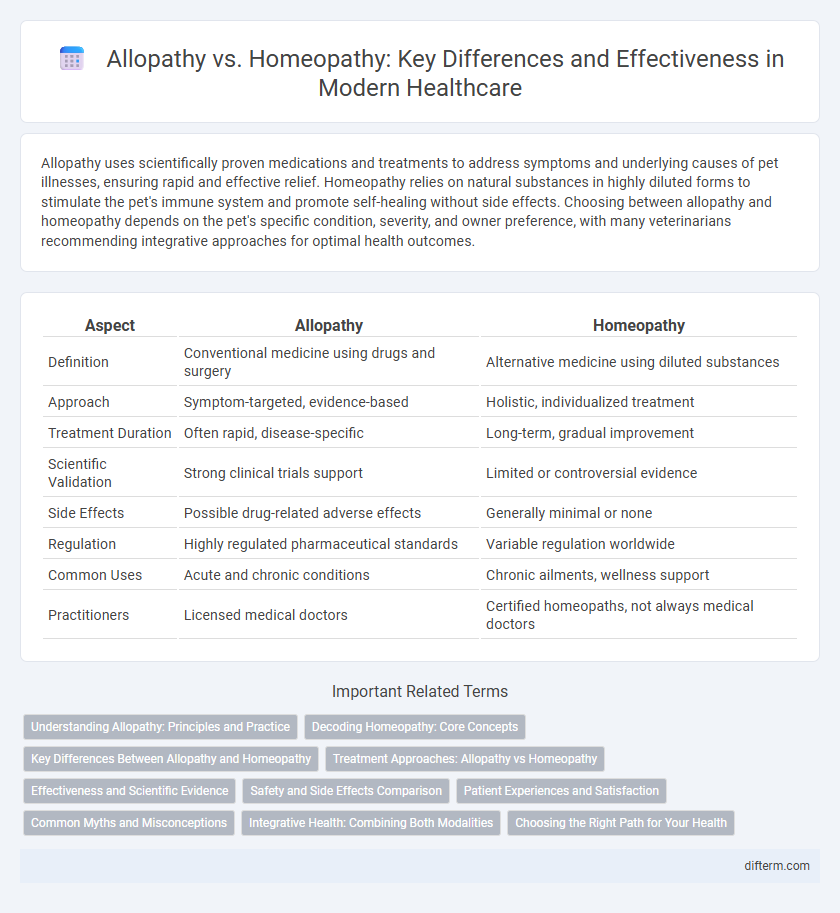Allopathy uses scientifically proven medications and treatments to address symptoms and underlying causes of pet illnesses, ensuring rapid and effective relief. Homeopathy relies on natural substances in highly diluted forms to stimulate the pet's immune system and promote self-healing without side effects. Choosing between allopathy and homeopathy depends on the pet's specific condition, severity, and owner preference, with many veterinarians recommending integrative approaches for optimal health outcomes.
Table of Comparison
| Aspect | Allopathy | Homeopathy |
|---|---|---|
| Definition | Conventional medicine using drugs and surgery | Alternative medicine using diluted substances |
| Approach | Symptom-targeted, evidence-based | Holistic, individualized treatment |
| Treatment Duration | Often rapid, disease-specific | Long-term, gradual improvement |
| Scientific Validation | Strong clinical trials support | Limited or controversial evidence |
| Side Effects | Possible drug-related adverse effects | Generally minimal or none |
| Regulation | Highly regulated pharmaceutical standards | Variable regulation worldwide |
| Common Uses | Acute and chronic conditions | Chronic ailments, wellness support |
| Practitioners | Licensed medical doctors | Certified homeopaths, not always medical doctors |
Understanding Allopathy: Principles and Practice
Allopathy, also known as conventional medicine, operates on the principle of combating diseases using drugs, surgery, and other interventions that produce effects opposite to the symptoms. It relies heavily on evidence-based practices, clinical trials, and biomedical research to diagnose and treat illnesses effectively. The practice involves specialized healthcare professionals applying standardized protocols to address a wide range of acute and chronic medical conditions.
Decoding Homeopathy: Core Concepts
Homeopathy is based on the principle of "like cures like," where highly diluted substances stimulate the body's self-healing mechanisms. Unlike allopathy, which uses targeted pharmaceuticals to treat symptoms, homeopathy emphasizes individualized treatment and holistic care. Its core concepts include potentization, minimum dose, and the vital force, distinguishing it from conventional medicine approaches.
Key Differences Between Allopathy and Homeopathy
Allopathy utilizes pharmacologically active agents or physical interventions to directly target symptoms and diseases, focusing on evidence-based treatments validated through clinical trials. Homeopathy employs highly diluted substances based on the principle of "like cures like," emphasizing individualized treatment and the body's self-healing capacity. Key differences include the scientific basis, dosage forms, treatment approach, and regulatory acceptance, with allopathy widely practiced in conventional medicine and homeopathy considered complementary or alternative.
Treatment Approaches: Allopathy vs Homeopathy
Allopathy employs evidence-based, symptom-targeted treatments using pharmaceuticals and surgical interventions to address specific health conditions. Homeopathy utilizes highly diluted substances aiming to stimulate the body's self-healing through individualized remedies based on the principle of "like cures like." These contrasting approaches reflect fundamental differences in methodology, with allopathy emphasizing measurable physiological effects and homeopathy focusing on holistic patient-centered care.
Effectiveness and Scientific Evidence
Allopathy relies on evidence-based treatments validated through rigorous clinical trials, demonstrating effectiveness in managing acute and chronic conditions. Homeopathy, lacking consistent scientific support and reproducible results, remains controversial regarding its therapeutic efficacy. Medical consensus favors allopathy for its proven mechanisms and measurable outcomes in patient care.
Safety and Side Effects Comparison
Allopathy treatments often involve pharmaceutical drugs that can cause side effects ranging from mild allergic reactions to severe organ damage, necessitating careful dosage and monitoring by healthcare professionals. Homeopathy uses highly diluted substances, which proponents claim minimize toxicity, but its safety and efficacy remain scientifically controversial due to lack of robust clinical evidence. Patients should consult qualified medical practitioners to weigh risks, side effects, and therapeutic benefits before choosing either allopathic or homeopathic treatment options.
Patient Experiences and Satisfaction
Patient experiences in allopathy often highlight rapid symptom relief and access to advanced diagnostic tools, contributing to high satisfaction in acute and emergency care. Homeopathy users frequently report enhanced personal attention and holistic treatment approaches, which foster patient trust and long-term satisfaction despite slower symptom resolution. Comparative studies indicate that patient satisfaction varies significantly with treatment goals, condition severity, and individual beliefs about healthcare efficacy.
Common Myths and Misconceptions
Allopathy often faces myths claiming it is purely symptom-focused, ignoring holistic care, while homeopathy is mistaken as entirely natural and free of side effects despite limited scientific evidence. Common misconceptions include the belief that homeopathy cures chronic diseases effectively, whereas allopathy is seen as harsh or harmful even though it is rigorously tested and evidence-based. Understanding these inaccuracies helps patients make informed decisions grounded in clinical research and safety standards.
Integrative Health: Combining Both Modalities
Integrative health combines allopathy and homeopathy to offer comprehensive treatment that addresses both symptoms and root causes of illness. Allopathy provides evidence-based, rapid relief through pharmaceuticals and surgeries, while homeopathy supports the body's natural healing processes with individualized, low-dose remedies. This holistic approach enhances patient outcomes by leveraging the strengths of both modalities in a personalized healthcare plan.
Choosing the Right Path for Your Health
Choosing the right health path involves understanding the fundamental principles of Allopathy and Homeopathy, where Allopathy focuses on evidence-based medicine and targeted treatments, while Homeopathy emphasizes holistic, individualized care using highly diluted substances. Research indicates that Allopathy is generally preferred for acute and emergency conditions due to its rapid and scientifically tested interventions. Homeopathy may appeal to those seeking natural and gentle approaches for chronic and preventive health, but consultation with a qualified healthcare professional ensures safe and effective decision-making.
Allopathy vs Homeopathy Infographic

 difterm.com
difterm.com